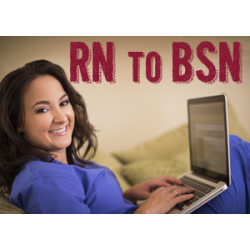
An RN-to-BSN completion program is designed specifically for registered nurses (RNs) that already hold a license to practice in the U.S. The program is popular among RNs with an associate’s degree in nursing (ADN) or hospital diploma, because it enables them to complete their baccalaureate degree in a streamlined manner. A typical RN-to-BSN program builds on the RN’s current knowledge and experience with an advanced curriculum that includes leadership, health assessment, aging and health, information technology, community health nursing, design and coordination care, nursing research, pharmacology, and therapeutics.
There are hundreds of RN-to-BSN completion programs offered in the U.S. They are available at numerous four-year colleges and universities. While the program typically takes two years to complete, some programs allow students to transfer credits from their previous coursework; this may allow them to earn their BSN in less time. To enroll, students must hold an associate of science in nursing (ASN), an associate of applied science in nursing (AAS), or a diploma in registered nursing, as well as a current RN license. Students may also have to pass background, health, and safety checks. Assessment tests and an entrance exam may be required, as well as drug screening.
Tuition costs vary significantly based on the type of school, type and length of program, and other factors. In reviewing tuition costs for dozens of RN-to-BSN programs, we found that the typical program costs between $15,000 and $45,000 to complete. Bear in mind that state residents typically pay lower tuition at public colleges and universities, while private schools tend to charge top dollar. Fortunately, the investment will pay off in either case.
RNs are among the highest-paid nurses in the healthcare industry. There are more than 2.7 million registered nurses employed nationwide; 1.5 million work in hospitals, and the rest are employed by home healthcare services, nursing care facilities, outpatient care centers, and physicians’ offices. The median RN receives an annual salary of approximately $66,000, according to the Bureau of Labor Statistics (BLS). However, those with BSN degrees can earn top-quartile pay, which typically exceeds $80,000 per year according to the BLS.
A bachelor’s degree can significantly enhance the earnings potential, career trajectory, independence, and mobility of a registered nurse. Browse our website’s directory to find the best RN-to-BSN completion programs in your local area.
